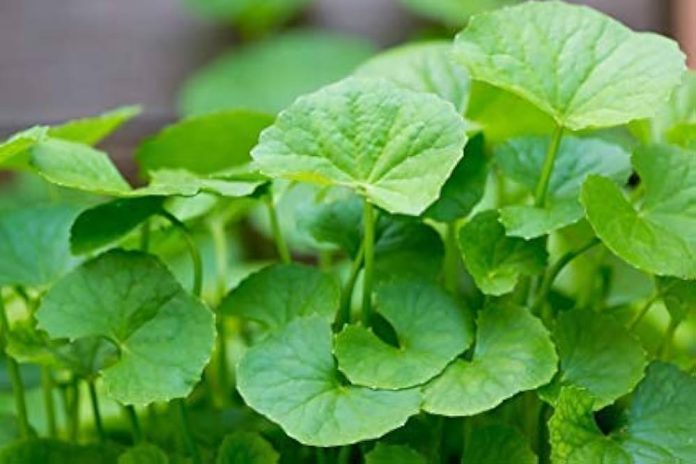Prof (Dr.) Vikas Sharma, Komal Sudan
Centella asiatica, also called thalkudi, gotu kola, Indian Pennywort, belongs to the family Apiaceae. Thalkudi is the most used chief herbs to treat the skin diseases, to cure the wounds, to rejuvenate the nerve and brain cells that is why it is called as a “Brain food” in India. Centella asiatica is spread all over the tropical and sub-tropical areas of India in different altitudes of up to 600 m. It is widely distributed in South East Asia, India, Sri Lanka, China, Western South Sea Islands, Madagascar, South Africa, USA, Mexico, Venezuela, Columbia and South America. Thalkudi is a potential herb with the prospect of multifaceted health care uses and the scientific advice is clear that plant has got neuroprotective activities / useful in the enhancement of the brain. The leaf part of the thalkudi tree is good for any kind of problem in the stomach and has anti-ulcer, anti-diarrhoeal properties. It also contains vitamin C, vitamin B1, vitamin B2, niacin, carotene and vitamin A. The total ash includes chloride, sulphate, phosphate, iron, calcium, magnesium, sodium and potassium.
The plant has also been used in Chinese medicine with regards to the brain and as an anti-stress, anti-depressant. It also invigorates the brain / strengthens the central nervous system and the micronutrients present in the extract retard the aging process of brain / can work wonders for sharpening concentration power and revitalizing brain. It was earlier adopted for the management of numerous ailments like rheumatism, inflammation, syphilis, mental illness, epilepsy, hysteria, dehydration and diarrhoea. The probable applications of Centella for therapeutic usefulness is in the treatment of open wounds and burns, psoriasis, scleroderma, reduction of tissue swelling in keloids and hypertrophic scars, reduction of cellulite and photoaging.
In this traditional system of medicine, thalkudi is much valued as asiaticoside, a glycoside extracted from this plant is carried out in the treatment of leprosy and tuberculosis. Centella asiatica naturally contains antioxidants, anti-inflammatory substances and carbohydrates that may further indicate that the herb relieves skin dryness and possesses anti-ageing effects. Few of the traditional uses of gotu kola are in treating of fatigue / anxiety, venereal diseases, menstrual disorders and last, but not the least in treating of leprosy by slowing it down and thereby prolonging man’s life. Some works reveal that thalkudi creams or ointments can be potentially used to diminish scar formation and psoriasis. These creams may prove useful in the prevention of stretch during pregnancy.
As an antipyretic / analgesic, it has been employed in other systems of medicine for cholera, measles, jaundice, leukorrhoea, haematemesis, hepatitis, urethritis, toothache, smallpox, neuralgia, toothache, varices etc. Centella is well documented for its ethno-medicinal uses and pharmacological activity to cure most ailments with active chemical present in it. The therapeutic compounds of thalkudi can be employed for several diseases such as epilepsy, ageing, neurodegenerative diseases, diabetes, cardiac diseases, respiratory diseases and so on. This herb forms part of the practice of Ayurvedic medicine.


